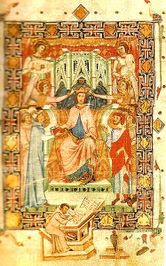Aragon was no exception. James I of Aragon (1208 - 1276) issued a decree:
All Jews and Saracens dwelling in our domains belong to the king and are, with all their possessions, under the king's especial protection. Any one of them who shall place himself under the protection of a nobleman shall lose his head; and all his possessions, wherever they be, shall be forfeited to the king.
This ensured that no non-Christian would place themselves in a feudal relationship with anyone else. It also meant that no Jew or Saracen could be made a prisoner of anyone but the king. Jews and Muslims had complete freedom of movement in the kingdom of Aragon; no one should harm the king's "property."
This did not give them complete social equality, of course. Jews lived in special areas of the cities unless they had the king's permission. They could not move to another city without permission. Trade with Christians needed special permission. Without the king's permission (yes, that word is being used a lot), they could not build a synagogue, create a cemetery or a school, or even buy wheat to make their bread.
James also tried to determine the rightness of Christianity by arranging the Disputation of Barcelona, pitting a converted Jew, the Dominican Friar Pablo Christiani, against the leading Jewish scholar Moshe ben Nachman, called Nachmanides. The debate was chiefly on the question "Was Jesus the Messiah?" (Christianity was declared the winner, but James gave Nachmanides 300 gold coins for his performance.)
James valued Jews for their knowledge and work ethic. A confident and close member of James' administration was his head bailiff and royal treasurer, Jehudano de Cavallería (1227 - 1286). James also had two Jews as his personal physicians, Masters David and Solomon, and the Jew Master Samson was physician to his queen.
Pope Clement IV tried to stop this tolerance of the Jews, but James was immune. His son, Pedro III, eventually relented and went so far as to agree to prohibit Jews from the position of bailiff. Jews had been too generous in their financial support of Aragonese wars and its navy to treat them too harshly; in fact, they were forgiven taxes for several years because of their donations to ship-building needs.
James I has been mentioned before, but there was more to his reign than arranging the Disputation of Barcelona. I'll tell you more about him (and maybe about his three wives) next time.


